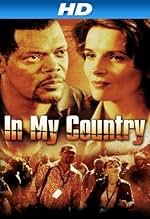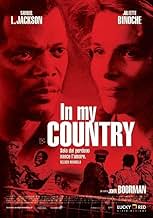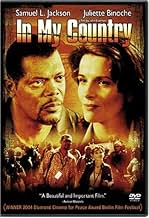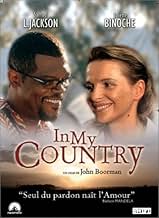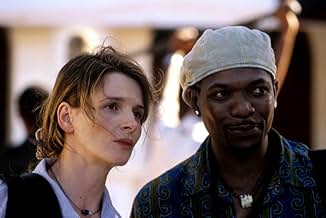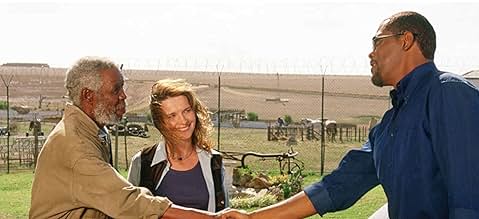A journalist and a poetess meet during the hearings of South African Truth and Reconciliation Commission.A journalist and a poetess meet during the hearings of South African Truth and Reconciliation Commission.A journalist and a poetess meet during the hearings of South African Truth and Reconciliation Commission.
- Director
- Writers
- Stars
- Awards
- 1 win & 3 nominations total
Menzi Ngubane
- Dumi Mkhalipi
- (as Menzi 'Ngubs' Ngubane)
Harriet Lenabe
- Albertina Sobandla
- (as Harriet Manamela)
Dan Robbertse
- Sgt. de Smidt
- (as Daniel Robbertse)
- Director
- Writers
- All cast & crew
- Production, box office & more at IMDbPro
Featured reviews
I am not a big fan of romances, but in this case I gave it a try because of director John Boorman ["Excalibur," "The Emerald Forest," "Hope & Glory, "Deliverance"] and actors Samuel L. Jackson ["Coach Carter," "Star Wars: Episodes 2 & 3," "The Red Violin"] and Juliette Binoche ["Chocolat," "The English Patient," and the 1992 remake of "Wuthering Heights"].
This film was in the better half of Boorman's, while Jackson and Binoche gave top-notch performances. The supporting role of Dumi, played by Menzi Ngubane was excellent, as he acted both as foil and antagonist between the couple.
I think the weakest elements of this film are in screenwriter Ann Peacock's dialogue and in the construction of the Anna Malan and brother Boetie characters. The first for taking on just a little too much burden of responsibility, especially in one somewhat uncharacteristic scene at one of the hearings with a particularly gory testimony, and the latter for being incomplete when a key development occurs that should have played more into the storyline and into Anna's reactions.
From what I've heard about the book by Antje Krog, I can understand why anyone who had read it before seeing this movie might be disappointed, but it was certainly clear to me by the marketing that this was a romance and not a cinematic litany of the horrors of Apartheid.
Given the turbulent background of Apartheid and the South African Truth & Reconciliation Commission proceedings, along with other clues, I was also expecting this to be an adversaries-fall-in-love story, which is the type of romance that I like the most. The collective incidents which drive Anna and Langston together are neither contrived or turgid, and fall comfortably in between, especially because they are juxtaposed with events based in reality. There is one most significant turn at one of the hearings, which, given it is true, would bring any two adversaries together, in peace if not in love.
I don't want to give away anything about the extent of their romance, except to say that how it ended up was a pleasant surprise and quite satisfactory. I wish I could recommend two other good romances that end so similarly and satisfactorily, but I would give away the surprise.
This film is certainly worth a rental or two, worth showing to friends, but I suppose the disturbing nature of the background events might keep some people from buying it for their home library, but if you bought a copy of "American History X," I think you might want to buy this one.
This film was in the better half of Boorman's, while Jackson and Binoche gave top-notch performances. The supporting role of Dumi, played by Menzi Ngubane was excellent, as he acted both as foil and antagonist between the couple.
I think the weakest elements of this film are in screenwriter Ann Peacock's dialogue and in the construction of the Anna Malan and brother Boetie characters. The first for taking on just a little too much burden of responsibility, especially in one somewhat uncharacteristic scene at one of the hearings with a particularly gory testimony, and the latter for being incomplete when a key development occurs that should have played more into the storyline and into Anna's reactions.
From what I've heard about the book by Antje Krog, I can understand why anyone who had read it before seeing this movie might be disappointed, but it was certainly clear to me by the marketing that this was a romance and not a cinematic litany of the horrors of Apartheid.
Given the turbulent background of Apartheid and the South African Truth & Reconciliation Commission proceedings, along with other clues, I was also expecting this to be an adversaries-fall-in-love story, which is the type of romance that I like the most. The collective incidents which drive Anna and Langston together are neither contrived or turgid, and fall comfortably in between, especially because they are juxtaposed with events based in reality. There is one most significant turn at one of the hearings, which, given it is true, would bring any two adversaries together, in peace if not in love.
I don't want to give away anything about the extent of their romance, except to say that how it ended up was a pleasant surprise and quite satisfactory. I wish I could recommend two other good romances that end so similarly and satisfactorily, but I would give away the surprise.
This film is certainly worth a rental or two, worth showing to friends, but I suppose the disturbing nature of the background events might keep some people from buying it for their home library, but if you bought a copy of "American History X," I think you might want to buy this one.
John Boorman, an interesting film maker, takes us to South Africa after Apartheid. Right after the country underwent the big change during the last decade of the last century, a commission was formed in order to hear the atrocities that were committed by the old regime, as the victims, and their families, were invited to come forward and speak to the panel that was investigating. The film is based on a novel by Antjie Krog, but not having read it, one can't really give an opinion about how true the film is to the novel.
"In my Country", the movie based on this book in its American release, came and went quickly. We tried to see it during its debut, bu it disappeared from local screens in no time. We recently caught the movie on cable.
There are some interesting aspects of what the commission was trying to accomplish in trying to bring members of the repressive force to justice. As in other conflicts, the people that were involved in the atrocities keep repeating about how they were following orders, a poor excuse, since no one owned up to having done anything wrong. After all, this was a country in which a white minority controlled a big black majority, and who wanted to keep things unchanged.
At the center of the story is Anna Malan, a white South African, who is a radio personality. She follows the commission as more and more people are coming forward to tell their stories. A Washington Post black reporter, Langston Whitfield, is also covering the process. Inevitably, both come together. While they clash at first, they find common ground in their desire to tell the truth about South Africa.
Juliette Binoche and Samuel L. Jackson are seen as Anna and Langston. Both give good performances. Brendan Gleeson is seen as the evil De Jager, a man responsible for some of the crimes committed against the poor black of the country who were deemed terrorist by the controlling whites. Menzi Ngubone plays Dumi, Anna's assistant and Sam Ngakone makes a dignified appearance as Anderson, who works for Anna's family.
The film is interesting to watch as Mr. Boorman has given us a film to think about the criminal acts that were committed by a group of people that didn't stop to consider the consequences of what they were doing.
"In my Country", the movie based on this book in its American release, came and went quickly. We tried to see it during its debut, bu it disappeared from local screens in no time. We recently caught the movie on cable.
There are some interesting aspects of what the commission was trying to accomplish in trying to bring members of the repressive force to justice. As in other conflicts, the people that were involved in the atrocities keep repeating about how they were following orders, a poor excuse, since no one owned up to having done anything wrong. After all, this was a country in which a white minority controlled a big black majority, and who wanted to keep things unchanged.
At the center of the story is Anna Malan, a white South African, who is a radio personality. She follows the commission as more and more people are coming forward to tell their stories. A Washington Post black reporter, Langston Whitfield, is also covering the process. Inevitably, both come together. While they clash at first, they find common ground in their desire to tell the truth about South Africa.
Juliette Binoche and Samuel L. Jackson are seen as Anna and Langston. Both give good performances. Brendan Gleeson is seen as the evil De Jager, a man responsible for some of the crimes committed against the poor black of the country who were deemed terrorist by the controlling whites. Menzi Ngubone plays Dumi, Anna's assistant and Sam Ngakone makes a dignified appearance as Anderson, who works for Anna's family.
The film is interesting to watch as Mr. Boorman has given us a film to think about the criminal acts that were committed by a group of people that didn't stop to consider the consequences of what they were doing.
I thought this movie did very well in exploring many different relationships and story lines. Above all, this movie asked all of the hard questions and brought into light a lot of truth that a lot of people don't like to look at.
The African sense of justice is about reconciliation, not revenge. By using the testimonials of several individuals, this movie was very educational. The healing that was allowed to happen within the process of reconciliation was very inspirational. Their sophisticated system made a lot of sense to me, and seems much more advanced than systems employed where i live in the US.
The relationship between Langston and Anna brought a political story to a personal level. It was beautiful to see Anna come to terms with her own sense of responsibility, being a white south African who had known of the atrocities, but had done nothing to stop them. Langston forced her to examine her position, but was also there to support her when she felt crushed by the enormity. Their acting was very convincing and skillful. I especially loved the scene where Anna attacked Langston, but thought the actual sex scene could have been more believable.
One character I haven't seen anyone comment on is Anna'a assistant, Dumi. This character brought the story to yet another level. He was the classic joker with hidden depths. His character communicated to the audience that nothing is black or white; nothing is simple; really it's all endlessly complex.
In fact, this story was anything but one-sided. It showed many masks that individuals wear in specific situations. It communicated so much about humanity, both as individuals and as members of a larger society. I find it quite relevant to my experience as a white American who knows my government is responsible for the suffering of multitudes at this moment in time, and I feel responsible and helpless at the same time.
A man who sat behind me in the theater kept telling his girlfriend he wanted to leave because it was unpleasant. Yes, it is unpleasant, if you're the type of person who doesn't like to look at reality. But what I cam away with from the movie was a feeling of awe about humanity's capacity for compassion.
The African sense of justice is about reconciliation, not revenge. By using the testimonials of several individuals, this movie was very educational. The healing that was allowed to happen within the process of reconciliation was very inspirational. Their sophisticated system made a lot of sense to me, and seems much more advanced than systems employed where i live in the US.
The relationship between Langston and Anna brought a political story to a personal level. It was beautiful to see Anna come to terms with her own sense of responsibility, being a white south African who had known of the atrocities, but had done nothing to stop them. Langston forced her to examine her position, but was also there to support her when she felt crushed by the enormity. Their acting was very convincing and skillful. I especially loved the scene where Anna attacked Langston, but thought the actual sex scene could have been more believable.
One character I haven't seen anyone comment on is Anna'a assistant, Dumi. This character brought the story to yet another level. He was the classic joker with hidden depths. His character communicated to the audience that nothing is black or white; nothing is simple; really it's all endlessly complex.
In fact, this story was anything but one-sided. It showed many masks that individuals wear in specific situations. It communicated so much about humanity, both as individuals and as members of a larger society. I find it quite relevant to my experience as a white American who knows my government is responsible for the suffering of multitudes at this moment in time, and I feel responsible and helpless at the same time.
A man who sat behind me in the theater kept telling his girlfriend he wanted to leave because it was unpleasant. Yes, it is unpleasant, if you're the type of person who doesn't like to look at reality. But what I cam away with from the movie was a feeling of awe about humanity's capacity for compassion.
A black journalist of Washington Post, Langton Whitfield; is sent by provocation by his boss to South Africa in order to "cover" the auditions of proceedings named Truth and Reconciliation Commission, that must decide if murders and torture authors can be amnestied if they say truth on act that they have made and express regrets in face of their victims. Langston encounters a young Afrikaner woman who follows also for South African radio the same sessions. She discovers the horror of Apartheid politics and she is bowled over by these facts. In these circumstances, Langston and Anna bring closer together. It is the story of the deep of human cruelty and also of the power of love and forgetting. The movie is dramatic and well played by Samuel L. Jackson and Juliette Binoche, but seems to be a little too oriented and melodramatic.
The performance and production is good, overall is good. its a movie about horrors that happened in south africa by WHITE people or government. The movie has some Major flaws in Side story too.
well its kinda movie about " black lives matter" thing. a married woman with kids has a job in radio. and she want to tell the truth to the country and world about the horrors happened to that country. where she met another black journalist from america. and then they both start working together to reveal more truth but also some romantic feelings which is kinda stupid. maybe she Pity soo much about black people ?.
-----------------spoilers (flaws)---------------
a married woman with two kids, sleeping with and between two black guys in same bed?
and then she kinda fall in love and didnt think about her kids? well because its not in the movie.
in the end the husband is angry but ok with everything ?
if there is no romnatic side story then this movie could done good.
well its kinda movie about " black lives matter" thing. a married woman with kids has a job in radio. and she want to tell the truth to the country and world about the horrors happened to that country. where she met another black journalist from america. and then they both start working together to reveal more truth but also some romantic feelings which is kinda stupid. maybe she Pity soo much about black people ?.
-----------------spoilers (flaws)---------------
a married woman with two kids, sleeping with and between two black guys in same bed?
and then she kinda fall in love and didnt think about her kids? well because its not in the movie.
in the end the husband is angry but ok with everything ?
if there is no romnatic side story then this movie could done good.
Did you know
- TriviaAfter seeing this film Nelson Mandela called it, "a beautiful and important film about South Africa's Truth and Reconciliation Commission. It will engage and influence not only South Africans, but people all over the world concerned with the great questions of human reconciliation, forgiveness, and tolerance."
- GoofsAll number plates on vehicles throughout the film (apart from archival footage) are fake and do not follow the format of older South African number plates.
- Quotes
Anna Malan: [last lines - voiceover] Because of you, this land no longer lies between us but within. It breathes becalmed, after being wounded in its wondrous throat. In the cradle of my skulll it sings, it ignites my tongue. Five thousand stories are scorched on your skin. I am changed forever.. I want to say, forgive me, forgive me, forgive me.
- ConnectionsEdited into In My Country: Deleted Scenes (2005)
- SoundtracksSenzenina
Arranged by Murray Anderson & Warrick Swinney
Performed by Princess Soi-Soi Gqeza, Mxolisi Mayekane, Mandia Lande, Michael Ludonga, Simpiwe Matole & The New Teenage Gospel Choir
Published by Hi-Z Sound
- How long is In My Country?Powered by Alexa
Details
- Release date
- Countries of origin
- Official sites
- Languages
- Also known as
- Country of My Skull
- Filming locations
- Production companies
- See more company credits at IMDbPro
Box office
- Budget
- $12,000,000 (estimated)
- Gross US & Canada
- $163,893
- Opening weekend US & Canada
- $22,383
- Mar 13, 2005
- Gross worldwide
- $1,491,434
- Runtime1 hour 45 minutes
- Color
- Sound mix
- Aspect ratio
- 1.85 : 1
Contribute to this page
Suggest an edit or add missing content


